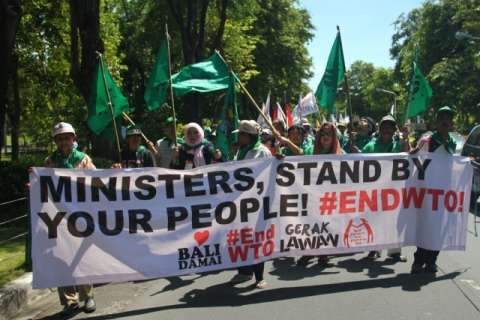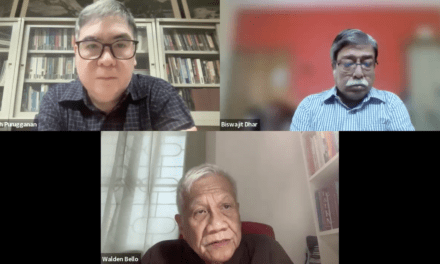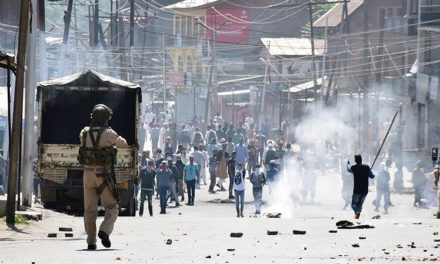New Delhi, 23 July 2014 — In a statement released ahead of the WTO General Council meeting tomorrow, farmers’ organizations in India called upon the Indian Government to stand firm on linking the Food Security proposal with the Trade Facilitation Agreement in WTO. Farmers’ leaders expressed shock over the Chair’s summary of the G 20 trade ministers meeting which was held on July 19 at Sydney. The Chair’s summary was fully silent over the food security proposal of the Bali Declaration, while it referred specifically to the Trade Facilitation Agreement. Thus “the G20 is increasingly turning to fixing the interest of developed countries by ignoring paramount concerns for people in developing countries and in least developed countries”, the farmers’ groups claimed.
Yudhvir Singh, leader of Bharatiya Kisan Union (BKU), one of the largest farmers organizations in India, said that, “in the backdrop of rising costs and extremely volatile global market prices, to fulfil the constitutional obligation of food security to its people, and also to ensure the livelihood security of producers, the Government of India needs to sustain and increase domestic agricultural production through price support, procurement and other measures to achieve self-sufficiency in food production, across different food grains. This is all the more important in the context of hundreds of thousands of farmers committing suicides in desperation”.
Kavitha Kuruganti, of Alliance for Sustainable & Holistic Agriculture (ASHA) said, “the Government of India lost a historical opportunity in correcting deep-seated WTO wrongs in the Bali Ministerial. At least now, they need to stand firm on our sovereign policy space related to food and livelihood security, and sustainable development pathways. Indian government at that time settled for a temporary solution with so called ‘peace clause’. Lack of progress towards a ‘permanent solution’ vindicates our apprehensions. At this point of time, the government should not buckle under any international pressure. It should remain firm in its position”.
Naresh Sirohi of BJP Kisan Morcha added,”India has currently taken a position to block the ratification of the TFA unless other elements of the Bali Outcome including permanent solution on the food security proposal and the LDC package are advanced. However we are hearing conflicting reports of India being ‘fully committed to the (Bali) package’. This clearly gives an impression that India may agree to the finalization of protocol on trade facilitation without the finalization of Doha Round especially on the issue of food security, which is against the principle of the single undertaking”.
Vijoo Krishnan of All India Kisan Sabha (AIKS) said that, “we are alarmed over government’s recent policy to freeze agricultural subsidies and to reduce public – food stockholding that will endanger food security and push Indian farmers out of agriculture. The government has to reverse it at national level and protect its policy space at WTO to provide production support to its farmers”.
In the context of G-20 Chairs summary, Indian farmers statement;
- Sought clarification from the Government of India whether it has moved away from its earlier stand.
- Called upon the Government not to buckle down under the pressure from USA, the EU and other developed countries and not to dilute its position of linking trade facilitation with food and livelihood security and by pushing a permanent solution to the G-33 Food Security Proposal.
- Called upon the Government of India to use current negotiations to correct fundamental WTO wrongs, to build up and lead a coalition /alliance of like-minded countries to collectively secure safeguards for sovereign development policy space, food security and the livelihood concerns of farmers and its people.
- Urged the government to take a proactive role in building such alliances as India did in building G-20 and G-33.
For more information please contact Yudhvir Singh at 098-681-46405 or Naresh Sirohi at 098-996-00011.
========
The Government should Clarify its Stand on Food & Livelihood Security and Trade Facilitation at WTO Negotiations
In the context of the recent WTO negotiations, we the undersigned farmers’ organisations express our disappointment on the Chair’s Summary of the G-20 trade ministers meeting. The Chair’s summary refers specifically to the Trade Facilitation Agreement (TFA) of the Bali Outcome but does not refer to the food security proposal, which is of paramount importance for the people of India.
Further, the Chair’s summary is fully silent on the livelihood concerns of farmers and other affected people in developing countries. This clearly shows that G20 is increasingly turning to fixing the interest of developed countries and totally ignoring the livelihood concerns of people in the developing countries and least developed countries.
Agriculture is the backbone of the Indian economy. Food security in India rests heavily on the Public Distribution System (PDS) and the PDS itself cannot be operated unless farmers are given enough support so that they can continue to produce. In the context of rising costs and extremely volatile global market prices, and to fulfil the constitutional obligation of food security to its people, the Government of India needs to sustain and increase domestic agricultural production through price support, procurement and other measures to achieve self-sufficiency in food production, across different food grains at that. This is all the more important in the present context of deep agrarian crisis manifesting itself in hundreds of thousands of producers committing suicides in desperation.
At the Bali ministerial, the Indian government had sought to secure such subsidies to farmers through the G-33 Food Security Proposal. However due to bungled negotiations, the nation settled for a Peace Clause which allows such subsidies only for a temporary period while the developed countries pushed the TFA which is a permanent agreement. We also bound ourselves under too many conditions in “freeze clauses”. In fact, many of us clearly pointed out that India has chosen to miss a historical opportunity to correct deep-seated WTO wrongs. We were however promised by the Indian government that they will push for a permanent solution to the food security proposal.
India’s primary interest, both domestically and globally, has to be the protection of agricultural producers’ livelihoods and the domestic production of food in order to meet the right to food of its people. Unfortunately the recent policy stance by the government is raising alarm as agricultural subsidies are being frozen and public food-stockholding is being progressively reduced, both of which will endanger food security of the country and push farmers out of agriculture, that too at a time when other sectors are not able to provide employment for the displaced.
India has currently taken a position to block the ratification of the TFA unless other elements of the Bali Outcome including permanent solution on the food security proposal and the LDC package are advanced. In a statement at WTO, India’s Ambassador stated that, “till we have an assurance and visible outcomes which convince developing countries that Members will engage in negotiations with commitment to find a permanent solution on public stock holding and all other Bali deliverables, especially those for the LDCs, India will find it difficult to join the consensus on the Protocol of Amendment.”
However we are hearing conflicting reports of India being “fully committed to the (Bali) package”. This clearly gives an impression that India may agree to the finalization of protocol on trade facilitation without the finalization of Doha Round especially on the issue of food security, which is against the principle of the single undertaking.
In the context of the G-20 Chair’s summary and various conflicting newspaper reports;
- We seek clarification from the Government of India whether it has moved away from its earlier stand.
- We call on the Government of India not to buckle down under the pressure from USA, the EU and other developed countries and not to dilute its position of linking trade facilitation with food and livelihood security and by pushing a permanent solution to the G-33 Food Security Proposal.
- We call upon the Government of India to use current negotiations to correct fundamental WTO wrongs, to build up and lead a coalition /alliance of like-minded countries to collectively secure safeguards for sovereign development policy space, food security and the livelihood concerns of farmers and its people. We urge the government to take a proactive role in building such alliances as India did in building G-20 and G-33.
Endorsed by:
Alliance for Sustainable & Holistic Agriculture (ASHA)
All India Kisan Sabha (AIKS)
Bhartiya Kisan Union (BKU), Delhi
Bhartiya Kisan Union, UP
Bhartiya Kisan Union, Haryana
Bhartiya Kisan Union, Punjab
Bhartiya Kisan Union, M.P.
Bhartiya Kisan Union, Himachal Pradesh
Bharatiya Krishak Samaj (BKS)
BJP Kisan Morchha
Desi Bihan Surakkhya Mach, Odisa
Green Brigade
Karnataka Rajya Ryotha Sanga (KRRS), Karnataka
Kerala Coconut Farmers Association (KCFA), Kerela
Maharashtra Shetkari Sangathan
Paschima Odisa Krisuk Sangathan Samanaya Samiti
Tamil Nadu Farmers Association, Tamil Nadu
Thalaanmai Uzhavar Iyakkam, Tamil Nadu
Thamizhaga Vivasayigal Sangam, Tamil Nadu










